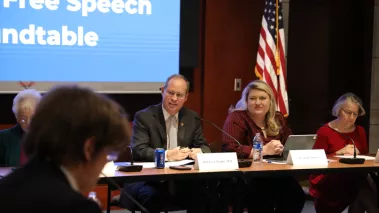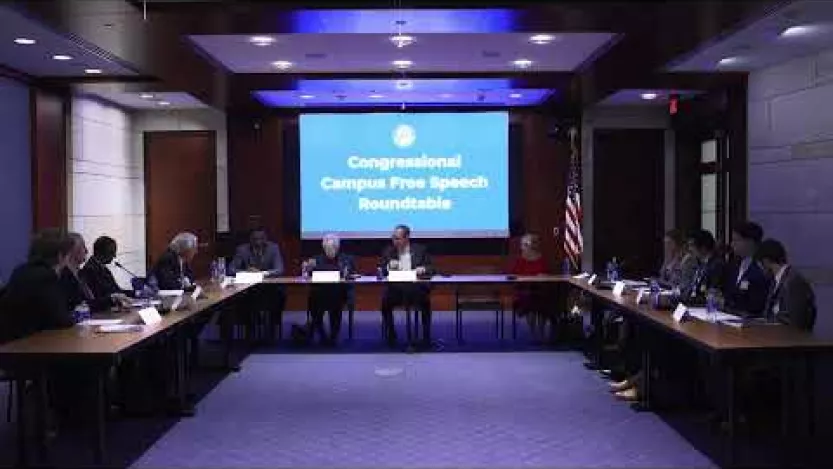Table of Contents
FIRE participates in Rep. Murphy’s Congressional Campus Free Speech Roundtable

Office of Rep. Greg Murphy
Rep. Greg Murphy (left-center) at the second annual Congressional Campus Free Speech Roundtable. FIRE Legislative Fellow Greg Gonzalez described FIRE’s latest data on campus censorship and the positive ways Congress can help combat it.
On Dec. 5, FIRE Legislative Fellow Greg Gonzalez participated in the second annual Congressional Campus Free Speech Roundtable discussion hosted by Rep. Greg Murphy.
“[We’ve] brought together lawmakers, alumni, stakeholders, to outline free speech concerns; bringing to light the actual and real imbalance that occurs on college campuses,” Murphy said of the event.
Reps. Burgess Owens, Virginia Foxx, Kat Cammack and Mariannette Miller-Meeks also participated in the discussion. They were joined by members of the Alumni Free Speech Alliance, along with representatives from the American Council of Trustees and Alumni and Young America’s Foundation, and undergraduate students from the University of Virginia and Washington and Lee University.
“Freedom of speech and thought on college campuses is essential to one of the most important missions of the university: the search for truth,” Dr. Foxx said in her opening remarks as the ranking member of the Education and Labor Committee.
When the conversation turned to Greg, he described FIRE’s latest data on campus censorship and the positive ways Congress can help combat it.
Greg directed participants to FIRE’s 2023 College Free Speech Rankings data, which shows that more than three-in-five students (63%) worry about damaging their reputations because someone misunderstands what they have said or done, and just over one-in-five (21%) feel a lot of pressure to avoid discussing controversial topics in their classes.

Just released: The 2022-2023 College Free Speech Rankings
Press Release
The largest survey on student free expression ever conducted adds 45,000 student voices to the national conversation about free speech on college campuses — and finds that many are afraid to speak out on their campus.
University of Virginia student Nick Cabrera and Washington and Lee University student Kameron Spivey expressed concerns about the role administrators play in students’ tendencies to self-censor on campus. FIRE’s recent rankings data validates many of their concerns. Greg informed the participants that FIRE’s data shows that one-in-four students report that their college administration’s stance on free speech on campus is not clear, and one-in-three report that it is unlikely the administration would defend a speaker’s rights if a free speech controversy occurred on campus.
Rep. Cammack, co-chair of the Congressional Campus Free Speech Caucus, asked the group for tangible solutions. Greg offered the following legislative remedies: Providing grants to fund orientation programs on free speech for incoming undergraduate students; and providing programming for high school students. He also encouraged Congress to consider passing legislation to address speech codes, such as that which would ban free speech zones nationwide, which twenty-two states have already done.
Students, alumni concerned about free speech, due process on campus
Roundtable attendees, particularly the undergraduate students, expressed concern about university policies on diversity, equity, and inclusion. FIRE’s recent Statement on the Use of Diversity, Equity, and Inclusion Criteria in Faculty Hiring and Evaluation notes, “Vague or ideologically motivated DEI statement policies can too easily function as litmus tests for adherence to prevailing ideological views on DEI, penalize faculty for holding dissenting opinions on matters of public concern, and ‘cast a pall of orthodoxy’ over the campus.”
Edward Yingling, co-founder of Princetonians for Free Speech, expressed concern about due process being undermined as a result of administrators’ expanded scope of power. He said, “Bureaucrats act as investigators, they act as judge and jury, and they act as prosecutors. There is no due process.”
We look forward to continuing to engage with legislators passionate about fostering a society that values freedom of speech and due process.
This concern aligns with FIRE’s findings in our most recent due process report: Fewer than one-in-six rated schools (15%) guarantee students a meaningful hearing, and more than seven-in-ten schools (72%) do not provide timely and adequate notice of the allegations to students accused of wrongdoing before expecting them to answer questions about the incident.
Rep. Miller-Meeks, ranking member of the Higher Education and Workforce Investment Subcommittee, concluded by reminding attendees that “the answer to speech you don’t like, is more speech. The answer to misinformation is more speech, it is not less speech.”
FIRE cannot agree more. We look forward to continuing to engage with legislators passionate about fostering a society that values freedom of speech and due process.
You can watch the roundtable in full below or on Murphy’s YouTube channel.

Recent Articles
FIRE’s award-winning Newsdesk covers the free speech news you need to stay informed.

O holy fight: New Hampshire Satanic Temple statue threatened by more than vandals

California and other states are rushing to regulate AI. This is what they’re missing

One day after FIRE lawsuit, Congress passes changes to filming permits in national parks


